Diplomatic Bluebook 2018
Chapter 3
Japan's Foreign Policy to Promote National and Global Interests
4 West Africa
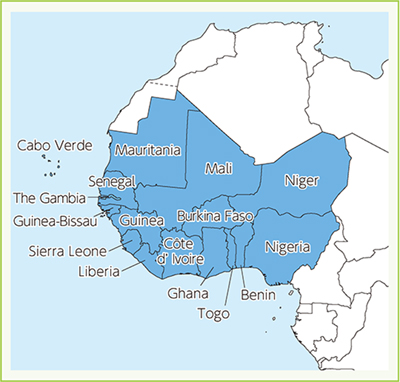
(1) Ghana
Ghana hosts the largest number of Japanese companies in West Africa. President Akufo-Addo, who was inaugurated in January, after a peaceful election is pursuing reforms such as restoring fiscal soundness and industrialization.
2017 was the 60th anniversary of the establishment of diplomatic relations between Japan and Ghana, the 90th anniversary of the arrival of Dr. Hideyo Noguchi in Ghana, and the 40th anniversary of the first deployment of Japan Overseas Cooperation Volunteers. A variety of events, such as Japanese drumming performances, fashion shows, symposiums on diplomacy and Dr. Hideyo Noguchi, and judo and karate tournaments were held to mark these anniversaries and promote a bilateral relationship. Minister of Health Agyemang-Manu visited Japan in July and made a courtesy call to Prime Minister Abe and acknowledged the contributions of Japan to the healthcare field.
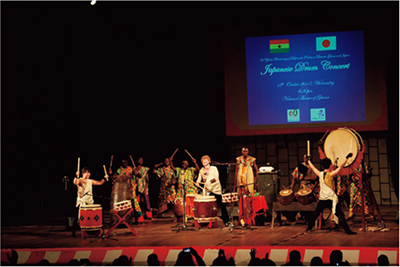 Event commemorating 60 years of the establishment of Japan-Ghana diplomatic relations (October, Accra, Ghana)
Event commemorating 60 years of the establishment of Japan-Ghana diplomatic relations (October, Accra, Ghana)(2) Guinea
Guinea has recovered from the Ebola Virus Disease crisis that occurred in 2014 and 2015. The country is now pursuing economic development centered on its high degree of potential in its agriculture and maritime industries and its rich mineral resources.
In June, President Condé (the 2017 AU chair) became the first Guinean head of state to carry out a bilateral visit in Japan. His talks with Prime Minister Abe included discussion of development assistance and cooperation on the international arena. President Condé expressed gratitude for the establishment of an office of the Japan International Cooperation Agency (JICA) in the Guinean capital Conakry and other cooperation by Japan, and promised to contribute to the TICAD process. A Japan-Guinea Business Forum was held during President Condé's visit, to enable public and private sector figures from both countries to meet and talk.
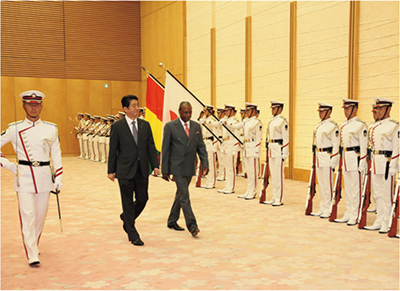 President Condé reviewing a guard of honor during his visit to Japan (June 20, Tokyo; Photo: Cabinet Public Relations Office)
President Condé reviewing a guard of honor during his visit to Japan (June 20, Tokyo; Photo: Cabinet Public Relations Office)(3) Côte d'Ivoire
Côte d'Ivoire is home to the Africa Development Bank, and the Port of Abidjan, which handles the largest volume of container cargo in West Africa, making it one of the region's distribution hubs. The country has enjoyed stable economic growth since the end of the civil war in 2012. It gives the impression of having regained its place as a core country in West Africa. It was selected to serve as a non-permanent member of the UN Security Council from June 2018 until 2019, and the UN Operation in Côte d'Ivoire (UNOCI) has achieved a complete withdrawal. On the other hand, issues relating to internal politics still remain, including frequent disturbances by some members of the national armed forces and ex-combatants.
With regard to relations with Japan, the first post-resumption yen loan agreement (the Abidjan Port Cereal Berth Construction Project) was signed in March, and in November, State Minister for Foreign Affairs Sato visited Côte d'Ivoire and made a courtesy call to President Ouattara and Minister of Foreign Affairs Amon-Tanoh, affirming the intention to strengthen bilateral ties.
(4) Senegal
As a stabilizing power for West Africa, Senegal achieves economic growth. In recent years, the discovery of offshore oil and natural gas reserves attracts a greater interest from Japanese companies. The country served, concurrently with Japan, as a non-permanent member of the UN Security Council for a two-year period beginning in January 2016.
In November, State Minister for Foreign Affairs Sato visited Senegal to attend the 4th Dakar International Forum on Peace and Security in Africa. In his speech during the opening ceremony he gave an overview of Japan's contributions to peace and security in Africa.
In December, President Sall visited Japan to attend the Universal Health Coverage (UHC) Forum 2017, at which he introduced the initiatives of Senegal as a model country for the implementation of UHC. During his talks with Prime Minister Abe they discussed cooperation on infrastructure development and human resources development, and they exchanged letters concerning grant aid in the fields of electricity, food security, and healthcare.
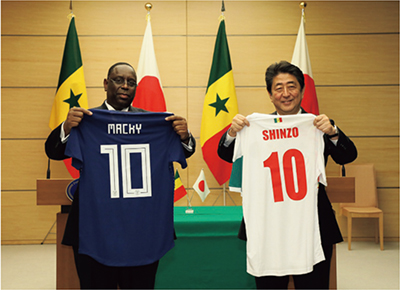 Exchanging football uniforms at the Japan-Senegal summit meeting (December 13, Tokyo; Photo: Cabinet Public Relations Office) *Senegal is in the same pool as Japan in the 2018 FIFA World Cup.
Exchanging football uniforms at the Japan-Senegal summit meeting (December 13, Tokyo; Photo: Cabinet Public Relations Office) *Senegal is in the same pool as Japan in the 2018 FIFA World Cup.(5) Nigeria
Nigeria, which has both the largest economy and population in Africa, has a great deal of potential as a resource-rich country. On the other hand, declining oil prices has worsened the country's financial situation, and the radical Islamist organization Boko Haram's terrorist acts in the northeast of the country and invasions of neighboring countries are issues that need to be addressed. President Buhari is placing emphasis on industrial diversification and enhancing security in order to address the abovementioned issues.
In May, Japan dispatched the Joint Africa Trade and Investment Promotion Mission led by Parliamentary Vice-Minister for Foreign Affairs Takei and discussions were held with several cabinet ministers and others.
(6) Burkina Faso
Burkina Faso is a landlocked country with an economy centered on agriculture. Domestic politics had been in a state of flux since the uprising in 2014 but the political situation has been comparatively stable since the inauguration of President Kaboré in 2015. On the other hand, Islamist radicals entering from Mali has become an issue because of the worsening security situation in neighboring Mali. In August, a terrorist attack occurred at a restaurant in the capital Ouagadougou.
On the occasion of the 72nd UN General Assembly in September, Foreign Minister Kono held talks with Minister of Foreign Affairs Barry and they affirmed the intention to cooperate on bilateral ties and in the international arena. Burkina Faso is one of two countries in Africa with diplomatic relations with Taiwan.
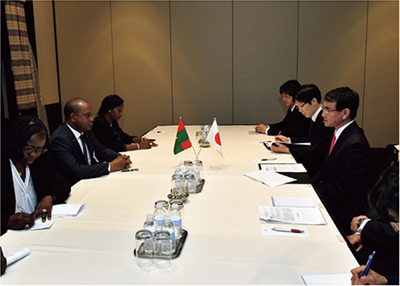 Japan-Burkina Faso Foreign Ministers' Meeting (September 20, New York, U.S.)
Japan-Burkina Faso Foreign Ministers' Meeting (September 20, New York, U.S.)(7) Benin
Benin has enjoyed peaceful presidential transitions since the 1990s, and it is referred to as a model for West African democracy. President Talon, a former entrepreneur, has set countering corruption as his administration's top priority. His administration has been operating stably since its inauguration in 2016.
In July Minister of Economy and Finance Wadagni visited Japan and held talks with Deputy Prime Minister and Finance Minister Aso and State Minister of Economy, Trade and Industry Matsumura. During the TICAD Ministerial Meeting held in August, Minister of Foreign Affairs and Cooperation Agbenonci held talks with Foreign Minister Kono and discussed economic cooperation and cooperation in the international arena.
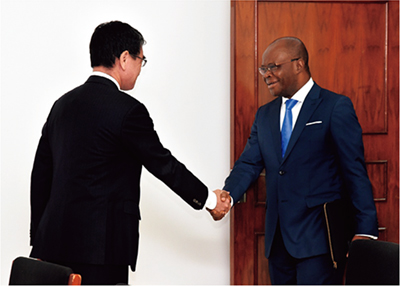 Japan-Benin Foreign Ministers' Meeting (August 25, Maputo, Mozambique)
Japan-Benin Foreign Ministers' Meeting (August 25, Maputo, Mozambique)(8) Mali
Ever since gaining independence, Mali has had to deal with conflict with the Tuareg group in the north of the country. Implementation of the agreement of peace and reconciliation signed in 2015 between Mali's Government and the northern Mali's armed groups continues to be a challenge. The entering into the country of Islamist radicals from the north and the spread of terrorism into central and southern parts of Mali as well as into neighboring countries has become serious problems. In February, countries in the Sahel Region, including Mali, made the decision to establish joint forces to respond to the security problem.
To support peace and stability in Mali, Japan provides the Malian police forces and law enforcement authorities with equipment to help them maintain security. Japan has also coordinated with the UN organizations to provide support for Mali's School of Peacekeeping.
(9) Liberia
Liberia developed in the early 19th century as a place for freed slaves from the U.S. to settle, and it was the first country in Africa to gain independence as a republic. The country has overcome the effects of the civil war that lasted approximately 14 years until 2003 and is now referred to as a model case for the consolidation of peace in Africa. Former President Sirleaf received the Nobel Peace Prize in 2011 and was Africa's first democratically elected female president. In December, a peaceful presidential election was held to find a successor, and this was won by former professional football player Weah.
Japan provided support through the United Nations Development Programme (UNDP) for strengthening the security enforcement system over the course of the elections and also dispatched election observers.
Hideko Hadzialic, Deputy Country Director at
United Nations Development Program (UNDP), Sudan
Sudan is a strategically important country located between Africa and Arab regions, facing the Red sea, which is called the gateway to Asia, Europe, and the Gulf region. It is the third largest country in Africa and the 16th largest country in the world.
Humanitarian, Development, and Peace Nexus
Darfur in western Sudan faces one of the most serious humanitarian crises in the world. Southern Sudan has been challenged by the issue of the preventing the conflict between refugees and their host communities since South Sudan declared its independence in 2011. Eastern Sudan hosts many immigrants from Eritrea and Ethiopia. Northern Sudan is confronted with the issue of security of water and conflict prevention due to climate change and desertification. Sudan faces these challenges concerning “the humanitarian, development, and peace nexus,” and thus receives some of the highest attention in the headquarters of the UNDP where I worked until recently.
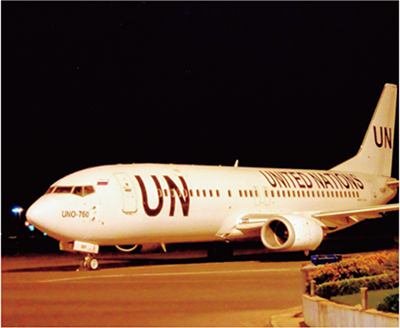 Khartoum International Airport
Khartoum International AirportIn June 2017, the United Nations Security Council adopted a resolution to reduce the number of the military and police personnel of the African Union- United Nations Mission in Darfur (UNAMID) by 30%, which translated to reducing military personnel down to about 11,000 and police officers down to less than 3,000. Considering the security situation and the human rights protection on the ground, further reduction is scheduled in 2018. However, there remains a lot of issues, such as the development of the legal system for peace building and the requirement for development based on the human rights situation. There are about 80 staff members in the UNDP Darfur office, including United Nations Volunteers (UNV) (there are about 200 staff members in the UNDP in Khartoum, the capital of Sudan). In order to foster a seamless partnership between the UN peacekeeping mission and the UNDP as a development agency, it is necessary to increase the fund and the support to enhance UNDP's field presence.
Activities of Japanese Nationals at UNDP Sudan
There are many Japanese working for the United Nations in Sudan. They include the Representative at the Office of the United Nations High Commissioner for Refugees (UNHCR) in Sudan and the Deputy Representative of the United Nations Human Settlements Programme (UN-HABITAT). Four Japanese including myself are working at the UNDP. Ms. Yumi Amano and Ms. Chihiro Bise are working for conflict prevention and recovery assistance under the Youth Volunteers Supporting Peace and Recovery project in Darfur, which is supported by the Japanese Government. They have so far worked with about 380 Sudanese youth volunteers to reduce poverty with environmental considerations, by supporting proposals for small and medium-sized businesses and bridging with microfinance institutions. They are working hard, side by side with local youth who wish to contribute to community development and peace building, and sharing joy and sorrow to create a cooperative structure between communities. Their effort for building a relationship of trust with local residents, which sometimes requires great patience, is a true testament of the Japanese spirit.
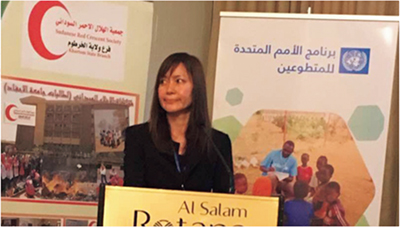 International Volunteer Day
International Volunteer DaySpeech to give encouragement to volunteers (author)
Mr. Tomokazu Serizawa is working on the frontline of supporting the humanitarian, development and peace nexus. He visits refugee camps near the southern border of South Sudan to grasp the long-term needs of the refugees and the host village residents and to understand their situations firsthand. The local residents appreciate the joint assistance of Japan and the UNDP and hope to expand such assistance to other communities. Currently, Mr. Serizawa is investigating the path way of extremism. The military defeat of ISIS in Iraq and Syria has led Sudanese ISIS members to return to Sudan, which might risk social instability if not handled delicately. The UNDP intends to enhance its technical assistance including revision of anti-terrorism laws, increased employment opportunities mainly targeted for the youth, and advocacy (policy proposal).
I would like to let the world know about the successful cases of cooperation on the humanitarian, development, and peace nexus in Sudan together with Japanese assistance.
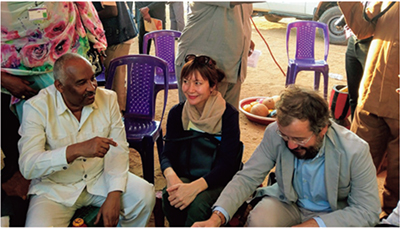 (From left) Minister of International Cooperation, author, a representative of Spanish embassy, visiting the project related to the humanitarian and development nexus, which supports both the refugees and the host community in White Nile.
(From left) Minister of International Cooperation, author, a representative of Spanish embassy, visiting the project related to the humanitarian and development nexus, which supports both the refugees and the host community in White Nile.
